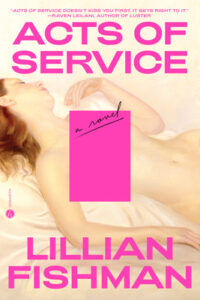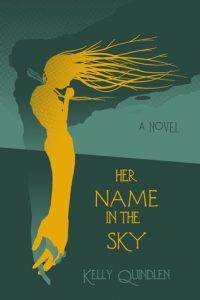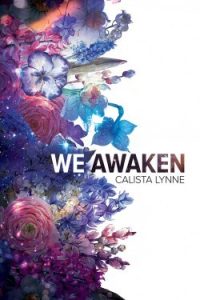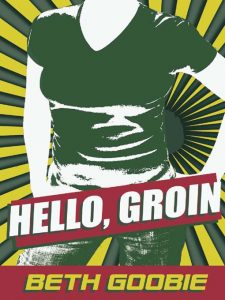I think that first I have to get the thing I want, and maybe then I can figure out why I wanted it, or whether it’s good.
This was a frustrating reading experience.
The main problem I had was that the questions it raised were ones I’m invested in, and conversations I want to see more of in literature. But while there were glimmers of insight and memorable lines, ultimately it felt like these ideas meandered around in circles, eventually petering out without making any real statement.
At first, I was enthralled by this story. Eve is a messy, deeply flawed character, and we spend a lot of time inside her head as she processes. She had a girlfriend, but she feels unfulfilled. What she really wants, underneath any noble façade, is to be fucked. Preferably by a lot of people. She wants her body, which she knows meets beauty standards, to be admired. So she posts naked photos of herself on the internet, which leads to her having a tumultuous, confusing relationship with Nathan and Olivia.
She originally meets Olivia, and she’s who Eve is interested in—but then Olivia insists she needs to meet Nathan. Olivia adores Nathan, who is also her boss. Despite Eve’s reservations, she is pulled under his spell, and finds herself validated by how he treats her, how they both value sex in the same way. Even as she worries for Olivia, she can’t help but compete with her for Nathan’s attention (yes, while she keeps this from her girlfriend).
This is a deeply introspective novel, with Eve constantly questioning what she’s doing and how it fits into her supposed values—but she never seems to get much below the surface or come to any conclusions.
Most men seemed hardly to exist for me, except nebulously, as acquaintances or obstacles. And then, occasionally, in the presence of a man who exuded power, I would feel a kind of weightlessness; I could feel myself growing soft and dimpling amiably under even a light touch of his attention. This was a truth so inadmissible in my life that I insisted even to myself that it was not the case.
Early on in the novel, there were moments that felt uncomfortably as if it’s peeled part of me away as a reader, exposing a thought or feeling I’d rather not admit to, even if, oddly, I related more to Eve’s girlfriend Romi than her.
I enjoy reading about complicated, flawed female main characters, so I enjoyed this insight into Eve. She feels like she’s trying to hold back her true nature, the parts of her that are vain and petty and selfish, resulting in these thousand tiny sacrifices for some indistinct noble cause. She puts Romi on a pedestal, who “so often wanted exactly what it seemed she was supposed to want and then enjoyed it once she got it.” She values their relationship because she wants to be deserving of that or to aspire to being the kind of person Romi is—without really recognizing Romi as a complete, flawed human being in herself.
Queerness rose in my life like a faith: When I came to New York I found there were shared beliefs, shared systems, not among all queer people but among a set to whom queerness meant a specific type of ethical awareness. Here was how I would know what was good to want.
Eve spends a lot of time thinking about sexuality, and specifically the difference between being with a man and being with a woman, and honestly… I found a lot of it perplexing. For one thing, she seems to think being with only one gender is boring or means you’re not truly living, but because she’s so flawed, I’m not expecting to agree with her on a lot. But there are a few ideas that this novel returns to over and over that got under my skin.
One is the assertion that being with women is both natural—that’s who Eve is usually attracted to—and awkward. That women who date are always circling each other, waiting for someone else to make the first move. That it’s exhausting, that you’re always “wondering who will make the first move, what it means to make the first move, what it means to want something as a woman, let alone to want another girl.”
It’s a common sapphic joke that we have trouble making the first move, of course. But the idea that when dating another woman you are left wondering “what it means to want something as a woman” is puzzling to me. I admittedly haven’t dated many men, but I found it much easier and more intuitive to navigate dating women and non-binary people, personally. But this idea that it’s somehow tiring to date women is returned to several times in the book, including being echoed by Romi.
So I’m supposed to think I can’t damage myself, that things don’t hurt me, if I choose them, if I see them clearly?
Ultimately, I lost interest in this story about halfway through as it just rehashed the Olivia/Nathan/Eve dynamic, which didn’t change much throughout. Eve enjoys being dominated and then feels guilty about it, but keeps coming back to it.
I wanted more depth to the conversations about power dynamics in sex, but they never really went anywhere. While what all three of them are participating in is BDSM, Nathan is disdainful of BDSM practices like negotiations or safe words. He seems to think they ruin the fun and mystery, and that he’s above all that.
There’s also something embarrassing about watching these two women obsess over what felt like a boring character. Nathan is just a rich, arrogant white guy. He doesn’t really seem to have any other personality traits. Both Eve and Olivia seem to treat what he’s offering them as something precious and rare, but power play is not unusual. There are many, many people who will fulfill sexual desires for humiliation, domination, and power play, but with bonuses like aftercare! Conversation! Respect for you as a multifaceted human being!
The more the story went on, the more frustrated I was at these rich people acting as if their awkward sex life was somehow novel or profound or… well, not boring. Yes, it’s easy to replicate gender norms, and it can even feel natural, because you’ve been trained into it from birth. That’s not particularly insightful or interesting.
It’s not just that Nathan is an asshole, of course: they’re all meant to be messy, deeply flawed people. It’s that I don’t see the appeal in any way. The things he says are so transparent that I don’t understand why Eve—who does occasionally challenge him and does ask questions about other details—doesn’t see through them.
For example, Nathan tells Eve, “I’ve always respected what you wanted—not just respected it but intuited it, discovered it, given it to you, in fact. Isn’t that true?” But “intuiting” is not above “respecting,” it’s below it. “Intuiting” is guessing what people want and doing that. You might be right. But you could be wrong. And just because you’ve successfully guessed before doesn’t mean your intuition of someone else’s desires should be valued above what they’re stating about what they want.
I found this book so frustrating because I was invested. I was interested in what it was doing. I just felt let down by where it ended up. It had moments of insight, but those didn’t feel worth reading a whole novel about two women idolizing this insufferable guy.
This is one of those books that leaves me feeling like I must be missing something. It feels like this is a novel that has something to say about sex and gender and queerness, but I could not tell you what it is. That sexual desire doesn’t always align with politics? Well, sure. That gender norms are easy to fall into? Can’t argue with that. That we can find pleasure even in unhealthy relationships? Yep.
I just wanted something more, and I kept waiting for it to end in a way that brought meaning to the experience, but it felt more like it fizzled out. I fully accept that I may just be missing the point entirely, and if you’ve read this book, I’d love to hear what you thought.





